Diving Sites in Port Blair



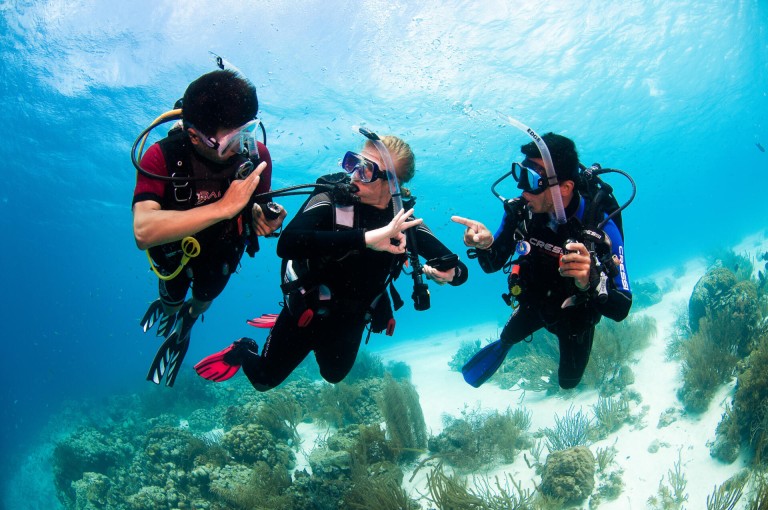
-
Aug 01, 2023
If you're a diving enthusiast who’s looking to deepen your diving knowledge, you may find yourself on the fence about whether to take the PADI (Professional Association of Diving Instructors) Deep Diver or Advanced Open Water Diver course. Both offer unique, challenging experiences and are certainly great steps forward in your diving journey. However, they have notable differences.
A Dive into PADI Courses
The PADI organisation offers a range of courses, from the beginner Open Water Diver to the professional Divemaster. Among the intermediate-level courses, two stand out for recreational divers seeking to further their skills: the Deep Diver and the Advanced Open Water Diver courses.
PADI Deep Diver Course
The Deep Diver course is designed to equip you with the knowledge and skills needed to safely and confidently dive deeper, down to a maximum of 40 meters (130 feet). Over the course of four deep dives under the guidance of a PADI professional, you'll learn about specific considerations for deep diving.
Requirements and What You'll Learn: To enrol in the Deep Diver course, you must be at least 15 years old and have an Adventure Diver certification. If you meet these criteria, you're ready to plunge into topics such as managing your gas supply, dealing with gas narcosis, and navigating deep waters.
One of the course's key teachings is safety: understanding the risks involved in deep diving, managing these risks, and emergency procedures. Completing this course enables you to handle the unique physiological and logistical challenges deep diving presents.
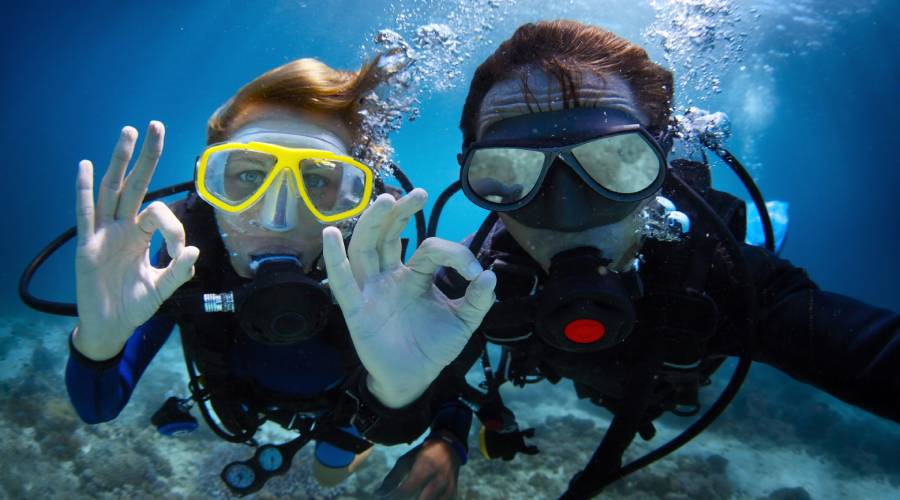
PADI Advanced Open Water Diver Course
In contrast to the specialised Deep Diver course, the Advanced Open Water Diver course offers a more varied skill set. It consists of five different Adventure Dives, two of which—Deep Adventure Dive and Underwater Navigation Dive—are compulsory.
Requirements and What You'll Learn: Open to those aged 12 and above with an Open Water Diver certification, the course helps divers increase their confidence and build their scuba skills. The elective dives you can choose from a list include options such as Peak Performance Buoyancy, Night Diving, and Wreck Diving, providing a broad range of diving experiences.
The Advanced Open Water Diver course aims to make you a well-rounded diver by developing diverse skills and expanding your comfort zone. Rather than focusing on one specific area, it encourages the exploration of different aspects of diving.
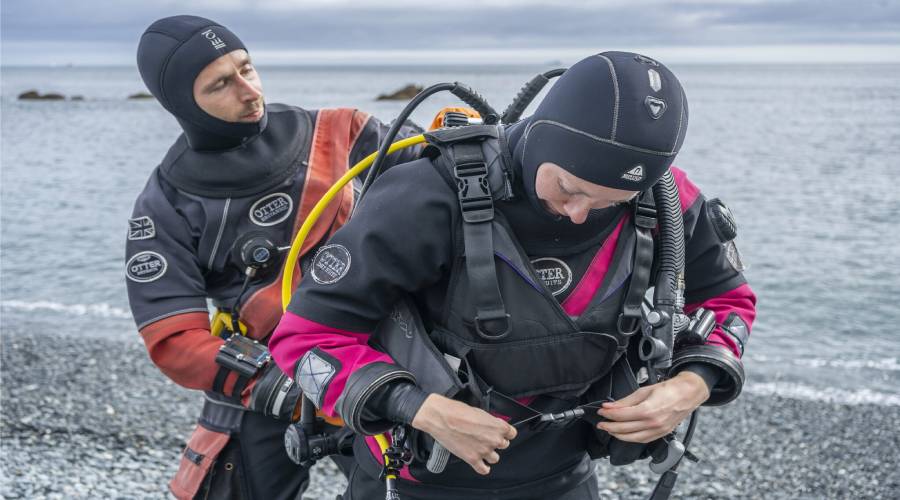
Differences Between the PADI Deep Diver and Advanced Open Water Diver Courses
While both are integral parts of scuba education, there are some distinct differences between the PADI Deep Diver and PADI Advanced Open Water Diver Courses.
Course Prerequisites
The first difference to note is in the prerequisites. For the AOWD course, you only need to have completed the PADI Open Water Diver course, which is the introductory level of scuba diving certification. This course offers an essential foundation, introducing divers to the fundamental skills, equipment, and basic safety concepts. The minimum age for enrolment is relatively low, at just 12 years old. This makes the AOWD course accessible to a broad range of divers, including younger enthusiasts looking to build on their initial diving experiences.
The Deep Diver course, on the other hand, requires a higher level of initial certification. You must be a PADI Adventure Diver or have a higher certification to enrol in the Deep Diver course. The Adventure Diver certification involves completing three Adventure Dives, which can include deep diving, navigation, or other specific diving activities. In terms of age, the Deep Diver course has a higher threshold. Participants must be at least 15 years old, reflecting the fact that deep diving presents more the potential risks and challenges that require a higher level of maturity and experience to manage safely.
Course Structure and Content
The AOWD course aims to increase divers' overall skill and confidence underwater by offering a broad overview of different aspects of diving, such as underwater navigation and deep diving. The course comprises five different adventure dives, including the mandatory Deep and Navigation Dives.
The Deep Diver course, however, is more specialised, focusing solely on the skills and knowledge required for deep diving, typically defined as diving between 18-40 meters/60-130 feet. The course comprises four dives, all of which are deep dives.
Diving Depth
The structure and content of the PADI Advanced Open Water Diver and Deep Diver courses are quite different. The Advanced Open Water Diver course is designed to enhance divers' skills and expand their knowledge about different types of diving. The course consists of five Adventure Dives, each focusing on a different aspect of scuba diving. Two of these dives—the Deep Dive and Underwater Navigation Dive—are mandatory for all divers, as these skills are crucial for advanced diving experiences. The other three dives can be selected by the divers themselves from a wide array of options offered by PADI, such as Peak Performance Buoyancy, Wreck Diving, Night Diving, Search and Recovery, and many others.
The Deep Diver course focuses specifically on diving at greater depths. This course consists of four open water dives, all of which take place between 18-40 meters (60-130 feet). These dives serve to familiarise the diver with the unique considerations, challenges, and experiences of deep diving. The Deep Diver course covers essential aspects of deep diving, such as planning and organizing deep dives, risk assessment and management, deep diving procedures, and managing your gas supply.
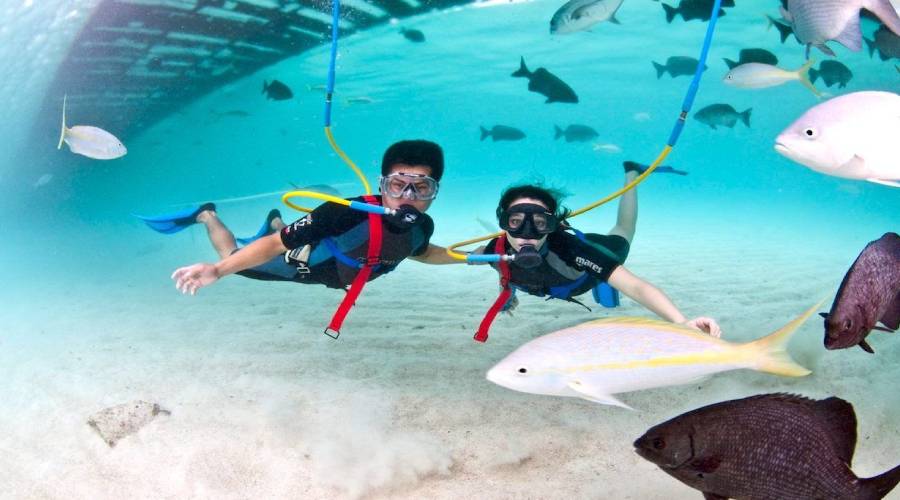
Course Duration
Typically, the AOWD course takes two to three days to complete, whereas the Deep Diver course may take three to four days, given the increased depth and the required additional safety measures. However, this can vary based on the dive centre, the individual's progress, and other factors.
Specialised Training
The AOWD course doesn't lean towards a single specialized training pathway. Instead, it provides a varied and expansive array of diving skills and techniques across different diving scenarios. This includes deep diving, underwater navigation, and a choice of three other adventure dives, which could cover anything from buoyancy control to identifying marine species, wreck diving or diving in low visibility conditions.
The Deep Diver course, on the other hand, offers specialized training specifically tailored for deep diving conditions. Deep diving presents unique challenges and risks, including increased pressure, potential for nitrogen narcosis, and managing air supply more closely due to higher consumption rates at depth.
Theoretical Knowledge
In both courses, divers learn important theoretical knowledge. The AOWD course includes broad scuba diving theory, while the Deep Diver course delves into more depth-specific theory, such as understanding pressure at depth, decompression sickness, and safety stops.
Flexibility
The AOWD course is more flexible than the Deep Diver course, as you can choose three elective adventure dives from a wide array of options, including night diving, wreck diving, search and recovery, and more. The Deep Diver course, however, is more focused and does not offer elective dives.
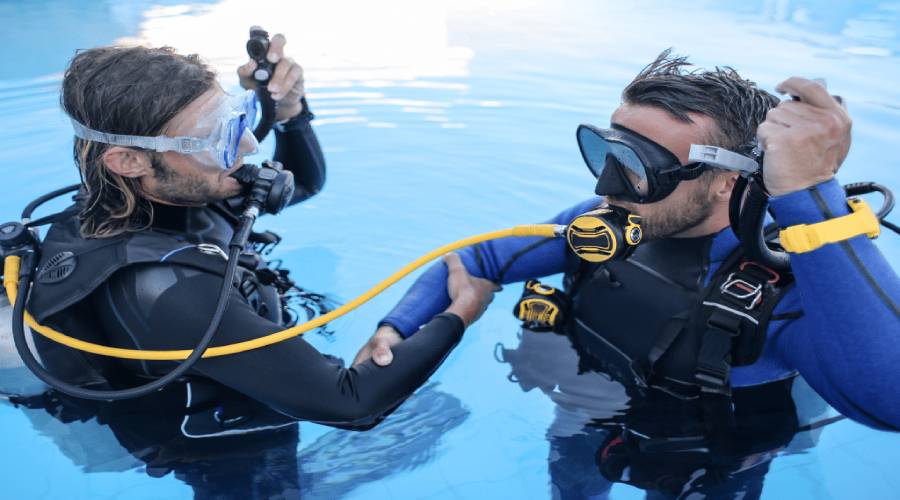
Here's a summary of the differences between the PADI Deep Diver and Advanced Open Water Diver Courses:
|
Aspects |
PADI Advanced Open Water Diver Course |
PADI Deep Diver Course |
|
Prerequisites |
PADI Open Water Diver; Minimum age: 12 years |
PADI Adventure Diver or higher; Minimum age: 15 years |
|
Course Structure |
Five Adventure Dives, two of which (Deep Dive and Underwater Navigation Dive) are mandatory, and three are chosen by the diver from a list of options |
Four deep dives, all focusing on skills and experiences specific to deep diving |
|
Depth Certification |
Certification to dive up to 30 meters/100 feet |
Certification to dive up to 40 meters/130 feet |
|
Course Duration |
2-3 days |
3-4 days |
|
Specialised Training |
A broad range of diving skills across different scenarios |
Focused on specific deep diving skills, like deeper water navigation, managing gas supply in deeper water, and deep diving emergency procedures |
|
Theoretical Knowledge |
General scuba diving theory related to a broad range of diving scenarios |
Depth-specific theory, including understanding pressure at depth, decompression sickness, and safety stops |
|
Flexibility |
More flexibility with elective adventure dives |
More focused on deep diving with no elective dives |
PADI Deep Diver and Advanced Open Water Diver Courses: Which one should you choose?
Choosing between the PADI Advanced Open Water Diver (AOWD) and Deep Diver courses depends largely on your personal interests, diving goals, and current level of experience.
Should You Choose the AOWD Course?
The AOWD course might be the right choice for you if:
- You're a beginner diver or just got your Open Water Diver certification. The AOWD course is a fantastic way to build upon the skills you learned in the Open Water Diver course.
- You want to explore various aspects of diving. If you're interested in exploring different types of diving—like night diving, wreck diving, or underwater photography—this course will provide a broad base of experiences.
- You prefer breadth over depth. The AOWD course will give you a wide range of diving skills and experiences rather than focusing on one specific type of diving.
Should You Choose the Deep Diver Course?
The Deep Diver course might be a better fit for you if:
- You're an experienced diver.
- You're drawn to the thrill and mystery of exploring deeper underwater environments.
- You're interested in technical diving as the Deep Diver course can be a stepping stone toward more advanced and technical diving certifications
Diving Sites in Port Blair
Diving Sites in Havelock Island
Diving Sites in Neil Island
.jpg)
.jpg)
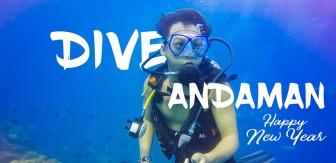
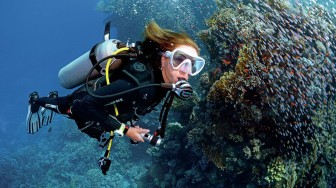
.jpg)